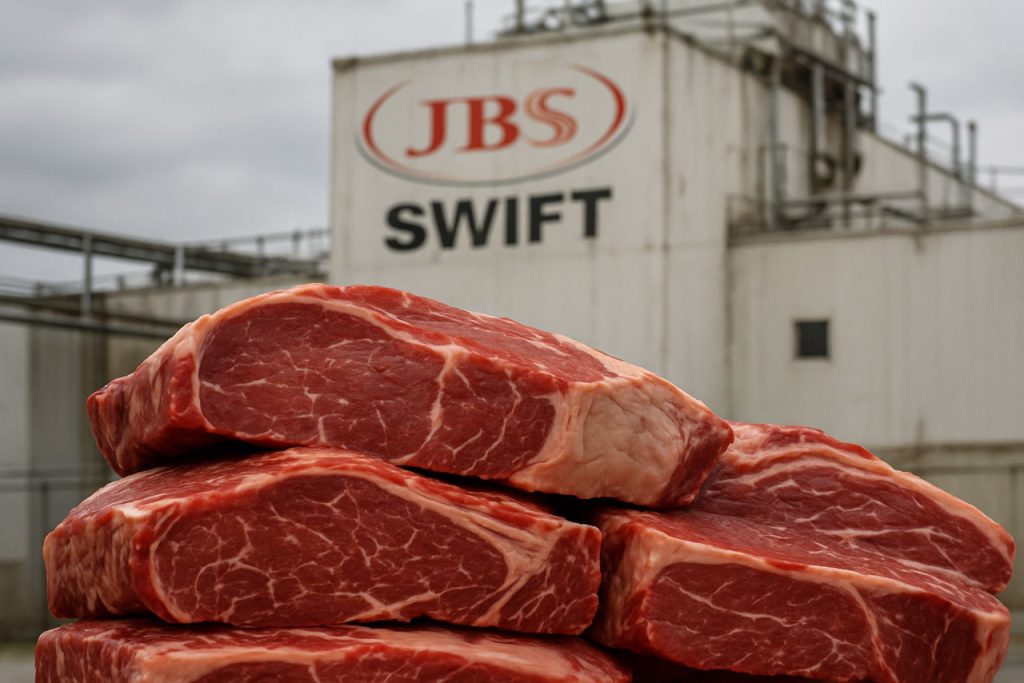
Inside the JBS Swift Meatpacking Antitrust Investigations: How Industry Giants Face Scrutiny Over Market Power and Competition. Discover the Far-Reaching Impacts of Ongoing Probes on the Meat Supply Chain.
- Introduction: The Rise of JBS Swift in Global Meatpacking
- Background: Antitrust Laws and the Meat Industry
- Timeline of Investigations into JBS Swift
- Key Allegations: Price Fixing and Market Manipulation
- Regulatory Bodies and Legal Actions Involved
- Impact on Ranchers, Suppliers, and Consumers
- JBS Swift’s Defense and Public Statements
- Comparative Analysis: Other Meatpacking Antitrust Cases
- Potential Outcomes and Industry Implications
- Conclusion: The Future of Competition in Meatpacking
- Sources & References
Introduction: The Rise of JBS Swift in Global Meatpacking
JBS S.A., operating in the United States as JBS Swift, has emerged as one of the world’s largest meatpacking companies, with a significant presence in beef, pork, and poultry processing. Founded in Brazil in 1953, JBS rapidly expanded through a series of acquisitions, including the purchase of Swift & Company in 2007, which marked its entry into the North American market. Today, JBS Swift is a dominant force in the global protein industry, processing millions of animals annually and distributing products to over 150 countries. The company’s scale and influence have made it a central player in the global food supply chain, but have also drawn scrutiny from regulators and industry stakeholders concerned about market concentration and competitive practices.
The rise of JBS Swift has paralleled increasing consolidation within the meatpacking sector, particularly in the United States, where a handful of companies control the majority of beef, pork, and poultry processing. This consolidation has prompted concerns about potential anticompetitive behavior, including price-fixing, market allocation, and the suppression of prices paid to livestock producers. As a result, JBS Swift and its parent company, JBS S.A., have become the subject of multiple antitrust investigations by regulatory authorities in the United States and abroad.
In the United States, the U.S. Department of Justice (DOJ) and the Federal Trade Commission (FTC) are the primary agencies responsible for enforcing antitrust laws and investigating potential violations in the meatpacking industry. These agencies have launched inquiries into allegations that major meatpackers, including JBS Swift, have engaged in practices that may restrict competition, harm consumers, or disadvantage independent farmers and ranchers. The investigations have focused on issues such as coordinated price-setting, information sharing among competitors, and the use of market power to influence supply chains.
Internationally, JBS S.A. has also faced scrutiny from competition authorities in other jurisdictions, reflecting the company’s global reach and the cross-border nature of the meat trade. The outcomes of these investigations have significant implications not only for JBS Swift, but also for the structure and functioning of the global meatpacking industry. As regulatory bodies continue to examine the competitive dynamics of the sector, the case of JBS Swift serves as a focal point for broader debates about market power, food security, and the regulation of multinational agribusinesses.
Background: Antitrust Laws and the Meat Industry
Antitrust laws in the United States are designed to promote fair competition and prevent monopolistic practices that can harm consumers, suppliers, and the broader economy. The primary statutes governing antitrust enforcement include the Sherman Antitrust Act of 1890, the Clayton Act of 1914, and the Federal Trade Commission Act of 1914. These laws prohibit activities such as price fixing, market allocation, bid rigging, and other forms of collusion or abuse of market power. Enforcement is carried out by agencies such as the U.S. Department of Justice (DOJ) and the Federal Trade Commission (FTC), both of which have the authority to investigate and prosecute violations.
The meatpacking industry, particularly in the beef, pork, and poultry sectors, has long been a focal point for antitrust scrutiny due to its high degree of consolidation. Over the past several decades, mergers and acquisitions have resulted in a small number of companies controlling a significant share of the market. JBS S.A., a Brazilian multinational, is one of the world’s largest meat processing companies and operates in the United States through its subsidiary, JBS Swift. Alongside other major firms, JBS Swift has been subject to antitrust investigations concerning allegations of anti-competitive conduct, including price fixing and market manipulation.
The rationale for these investigations stems from concerns that market concentration among a few dominant players can lead to reduced competition, higher prices for consumers, and lower prices paid to livestock producers. The DOJ and other authorities have periodically launched probes into the practices of leading meatpackers, including JBS Swift, to determine whether coordinated actions or abuse of market power have occurred. These investigations often involve the examination of internal communications, pricing data, and industry practices to assess compliance with antitrust statutes.
In addition to federal oversight, state attorneys general and regulatory bodies have also played a role in monitoring the meatpacking industry. The U.S. Department of Agriculture (USDA) enforces the Packers and Stockyards Act, which aims to ensure fair competition and trade practices in livestock, meat, and poultry markets. The intersection of USDA regulations and federal antitrust laws creates a comprehensive framework for addressing potential anti-competitive behavior in the sector.
The ongoing antitrust investigations into JBS Swift and other major meatpackers underscore the importance of robust enforcement mechanisms to maintain competitive markets and protect the interests of both consumers and producers in the U.S. meat industry.
Timeline of Investigations into JBS Swift
JBS S.A., operating in the United States as JBS Swift, is one of the world’s largest meatpacking companies. Over the past decade, the company has faced a series of antitrust investigations in the United States, focusing on allegations of price-fixing, market manipulation, and anti-competitive practices in the beef, pork, and poultry sectors. The following timeline outlines key developments in these investigations:
- 2015–2017: Initial scrutiny of the U.S. meatpacking industry intensified as ranchers and consumer groups raised concerns about declining cattle prices and alleged collusion among major beef processors, including JBS Swift. The U.S. Department of Justice (DOJ) and the Federal Trade Commission (FTC) began monitoring the sector for potential antitrust violations.
- 2019: Multiple class-action lawsuits were filed against JBS Swift and other major meatpackers, alleging conspiracy to fix prices and limit supply in the beef and pork markets. These lawsuits cited evidence of coordinated production cuts and information sharing among competitors.
- 2020: The DOJ launched a formal investigation into price-fixing in the beef industry, issuing subpoenas to JBS Swift and other leading processors. The investigation was part of a broader federal effort to address concerns about market concentration and anti-competitive conduct in the food supply chain (U.S. Department of Justice).
- 2021: The DOJ expanded its probe to include allegations of wage suppression and anti-competitive hiring practices in the meatpacking sector. JBS Swift was among the companies named in these investigations, which examined whether firms colluded to limit worker pay and mobility.
- 2022: JBS Swift agreed to settle some civil lawsuits related to pork price-fixing, paying millions of dollars without admitting wrongdoing. Meanwhile, federal investigations continued, with the DOJ and U.S. Department of Agriculture (USDA) collaborating to enhance oversight of meatpacking competition.
- 2023–2024: Ongoing litigation and regulatory scrutiny persisted, with JBS Swift facing continued legal challenges and calls for structural reforms in the meatpacking industry. The DOJ and USDA maintained active investigations, reflecting sustained government focus on antitrust enforcement in the sector.
This timeline demonstrates the evolving and multi-faceted nature of antitrust investigations into JBS Swift, involving both civil litigation and federal regulatory action. The outcomes of these cases are likely to shape future competition policy and industry practices in U.S. meatpacking.
Key Allegations: Price Fixing and Market Manipulation
The antitrust investigations into JBS Swift, a subsidiary of the global meat processing giant JBS S.A., have centered on serious allegations of price fixing and market manipulation within the U.S. meatpacking industry. These allegations assert that JBS Swift, along with other major meatpackers, conspired to artificially inflate the prices of beef and other meat products, while simultaneously suppressing the prices paid to livestock producers. Such conduct, if proven, would violate U.S. antitrust laws, particularly the Sherman Antitrust Act, which prohibits agreements that unreasonably restrain trade and competition.
The core of the allegations involves claims that JBS Swift and its competitors coordinated their production levels and shared sensitive pricing information to control the supply of beef in the market. By allegedly reducing slaughter volumes and limiting output, the companies are accused of creating artificial scarcity, which in turn drove up wholesale and retail meat prices. This practice not only impacted consumers, who faced higher prices at grocery stores, but also harmed cattle ranchers and farmers, who received lower prices for their livestock due to the reduced demand from processors.
Investigations by the U.S. Department of Justice (DOJ) and the Federal Trade Commission (FTC) have focused on whether JBS Swift and other leading meatpackers engaged in collusive behavior through direct communications, data sharing, and coordinated business strategies. The DOJ, as the primary federal agency responsible for enforcing antitrust laws, has issued subpoenas and conducted interviews with industry participants to uncover evidence of potential collusion. The FTC, which also has jurisdiction over anticompetitive practices, has monitored the industry for signs of market manipulation and unfair competition.
In addition to federal scrutiny, state attorneys general and industry stakeholders have raised concerns about the concentration of market power among a handful of large meatpacking firms, including JBS Swift. The allegations suggest that this concentration facilitates collusion and reduces competition, making it easier for companies to manipulate prices and control market dynamics. The U.S. Department of Agriculture (USDA) has also been involved, examining the impact of these practices on agricultural producers and rural economies.
Overall, the key allegations against JBS Swift in the antitrust investigations revolve around orchestrated efforts to fix prices and manipulate the meat market, with significant implications for consumers, producers, and the broader food supply chain.
Regulatory Bodies and Legal Actions Involved
The antitrust investigations into JBS Swift, one of the world’s largest meatpacking companies, have involved a range of regulatory bodies and legal actions across multiple jurisdictions. In the United States, the primary authority overseeing antitrust enforcement is the U.S. Department of Justice (DOJ), specifically its Antitrust Division. The DOJ investigates and prosecutes violations of federal antitrust laws, including alleged price-fixing, market allocation, and other anti-competitive practices in the meatpacking industry. The DOJ has initiated inquiries into whether JBS Swift and other major meatpackers colluded to fix prices and manipulate supply, impacting both livestock producers and consumers.
Another key federal agency is the Federal Trade Commission (FTC), which shares responsibility for enforcing antitrust laws and reviewing mergers and acquisitions for potential anti-competitive effects. The FTC has monitored consolidation in the meatpacking sector, including transactions involving JBS Swift, to ensure compliance with the Clayton Act and other competition statutes.
At the state level, several state attorneys general have launched their own investigations and lawsuits, often in coordination with federal authorities. These state officials are empowered to enforce state antitrust laws and protect local agricultural markets from monopolistic practices. For example, coalitions of state attorneys general have issued subpoenas and sought documents from JBS Swift as part of broader probes into the meatpacking industry’s pricing practices.
In addition to U.S. authorities, international regulatory bodies have also scrutinized JBS Swift’s operations. In Brazil, where JBS S.A. is headquartered, the Administrative Council for Economic Defense (CADE) is the principal competition authority. CADE investigates anti-competitive conduct and reviews mergers in the Brazilian market, including those involving JBS and its subsidiaries. The European Commission, the executive branch of the European Union responsible for competition policy, has also reviewed JBS’s acquisitions and market behavior within the EU to ensure compliance with European competition law.
Legal actions stemming from these investigations have included civil lawsuits filed by ranchers, consumers, and other stakeholders alleging price-fixing and market manipulation. Some cases have resulted in settlements, while others remain ongoing. Collectively, the involvement of these regulatory bodies underscores the global scope and complexity of antitrust oversight in the meatpacking industry, particularly concerning major players like JBS Swift.
Impact on Ranchers, Suppliers, and Consumers
The antitrust investigations into JBS Swift, one of the world’s largest meatpacking companies, have had significant implications for ranchers, suppliers, and consumers across the beef supply chain. These investigations, led by various governmental authorities, focus on allegations of anti-competitive practices such as price-fixing, market manipulation, and collusion among major meatpackers. The outcomes and ongoing scrutiny have shaped market dynamics, pricing structures, and the overall competitive landscape.
For ranchers, the alleged anti-competitive behavior by JBS Swift and other large meatpackers has been a source of economic strain. Many ranchers contend that consolidation in the meatpacking industry has reduced the number of buyers for their cattle, leading to diminished bargaining power and lower prices for livestock. This market concentration can make it difficult for independent producers to secure fair prices, potentially threatening the viability of smaller operations. The United States Department of Agriculture (USDA), which oversees agricultural markets and enforces the Packers and Stockyards Act, has received numerous complaints from ranchers regarding unfair market practices and has initiated efforts to increase transparency and competition in livestock markets.
Suppliers, including feed producers and transporters, are also affected by the market power wielded by large meatpackers like JBS Swift. When a few companies control a significant share of the market, suppliers may face pressure to accept less favorable contract terms or lower prices for their goods and services. This can ripple through the supply chain, impacting profitability and investment in rural communities. The Federal Trade Commission (FTC), which enforces antitrust laws in the United States, has highlighted the broader economic consequences of reduced competition in agricultural markets, noting that it can stifle innovation and limit opportunities for smaller businesses.
Consumers are not immune to the effects of alleged anti-competitive conduct in the meatpacking sector. Investigations have raised concerns that price-fixing and market manipulation may lead to artificially inflated prices for beef and other meat products at the retail level. This can reduce affordability and limit choices for consumers, particularly during periods of supply chain disruption. Regulatory agencies such as the U.S. Department of Justice (DOJ) have underscored the importance of maintaining competitive markets to protect consumer interests and ensure fair pricing.
In summary, the antitrust investigations into JBS Swift have spotlighted the interconnectedness of the meatpacking industry and its stakeholders. The actions and outcomes of these investigations continue to influence the economic well-being of ranchers, the operational environment for suppliers, and the prices and choices available to consumers.
JBS Swift’s Defense and Public Statements
JBS Swift, a subsidiary of the global meat processing giant JBS S.A., has been at the center of multiple antitrust investigations in the United States and abroad. In response to these inquiries, JBS Swift has consistently maintained its innocence, emphasizing its commitment to fair competition and compliance with all applicable laws. The company has issued a series of public statements and legal defenses aimed at addressing concerns raised by regulatory authorities and the public.
JBS Swift’s official position is that it operates within the boundaries of antitrust regulations and that its business practices are designed to foster efficiency and innovation in the meatpacking industry. The company has argued that market fluctuations in beef and other protein prices are driven by a complex set of factors, including supply chain disruptions, weather events, and global demand, rather than coordinated actions among industry players. JBS Swift has also highlighted its investments in technology, sustainability, and food safety as evidence of its commitment to responsible business practices.
In response to specific allegations of price-fixing and market manipulation, JBS Swift has stated that it does not engage in anti-competitive conduct and that it cooperates fully with all regulatory investigations. The company has pointed to its internal compliance programs, which include regular training for employees on antitrust laws and the establishment of reporting mechanisms for potential violations. JBS Swift has also noted that it has responded to subpoenas and requests for information from authorities such as the U.S. Department of Justice and the U.S. Department of Agriculture, providing documentation and participating in interviews as required.
JBS S.A., the parent company, has echoed these sentiments in its global communications, reiterating its dedication to transparency and ethical conduct. The company’s official communications emphasize that it takes all allegations seriously and is committed to cooperating with authorities to resolve any outstanding issues. JBS S.A. is one of the world’s largest food companies, with operations spanning multiple continents, and it has stated that maintaining trust with consumers, suppliers, and regulators is a top priority (JBS S.A.).
Overall, JBS Swift’s defense strategy centers on transparency, cooperation with authorities, and a public commitment to lawful and ethical business practices. The company continues to assert that it is a responsible industry leader and that the allegations against it are unfounded or mischaracterized.
Comparative Analysis: Other Meatpacking Antitrust Cases
The antitrust investigations into JBS S.A. and its subsidiary Swift are part of a broader pattern of scrutiny facing the meatpacking industry, particularly in the United States. To contextualize the JBS Swift case, it is instructive to compare it with other major antitrust actions involving leading meatpacking firms such as Tyson Foods, Cargill, and National Beef. These companies, alongside JBS, dominate the U.S. beef processing market, collectively controlling over 80% of the sector. This high level of concentration has raised persistent concerns about potential anti-competitive practices, including price-fixing, market allocation, and collusion to suppress prices paid to livestock producers.
One of the most prominent comparative cases is the series of investigations and lawsuits targeting alleged price-fixing in the beef, pork, and poultry sectors. For example, in 2020, the U.S. Department of Justice (DOJ) launched a formal investigation into the four largest beef processors—JBS, Tyson Foods, Cargill, and National Beef—amid allegations that these companies conspired to fix prices and manipulate supply, harming both ranchers and consumers. The DOJ’s involvement signaled the seriousness of the allegations and the potential for significant legal and regulatory consequences for the industry’s leading firms (U.S. Department of Justice).
Similarly, Tyson Foods, another major player, has faced multiple antitrust lawsuits and investigations. In the poultry sector, Tyson was implicated in a long-running price-fixing scheme, resulting in settlements and ongoing regulatory oversight. These cases often involve parallel civil litigation from both producers and consumers, as well as state-level investigations by attorneys general. The pattern of allegations—collusion to fix prices, reduce output, and share sensitive market information—mirrors those faced by JBS Swift, highlighting systemic issues within the industry.
Cargill and National Beef have also been named in various antitrust actions, often as co-defendants with JBS and Tyson. The recurring themes in these cases include accusations of coordinated efforts to depress prices paid to cattle ranchers and inflate prices for retailers and consumers. The U.S. Department of Agriculture (U.S. Department of Agriculture) has also conducted inquiries into market transparency and competition, further underscoring the regulatory focus on the sector.
In summary, the JBS Swift antitrust investigations are emblematic of broader concerns about market power and anti-competitive conduct in the meatpacking industry. The comparative analysis of other cases reveals a consistent pattern of regulatory and legal challenges faced by the industry’s largest firms, driven by concerns over market concentration, price manipulation, and the impact on both producers and consumers.
Potential Outcomes and Industry Implications
The ongoing antitrust investigations into JBS Swift, one of the world’s largest meatpacking companies, have the potential to reshape not only the company’s operations but also the broader meatpacking industry. These investigations, led by regulatory authorities such as the U.S. Department of Justice and the Federal Trade Commission, focus on allegations of anti-competitive practices, including price-fixing and market manipulation. The outcomes of these probes could have far-reaching consequences for market structure, regulatory oversight, and industry practices.
If the investigations result in findings of wrongdoing, JBS Swift could face substantial financial penalties, mandatory divestitures, or operational restrictions. Such measures are designed to restore competitive balance and deter future violations. For example, the U.S. Department of Justice has the authority to impose structural remedies, such as requiring the sale of certain assets or business units, to reduce market concentration and enhance competition. These actions could force JBS Swift to alter its business strategies, potentially leading to a more fragmented and competitive marketplace.
Beyond direct penalties, the investigations may prompt broader regulatory reforms within the meatpacking sector. Increased scrutiny could lead to stricter enforcement of antitrust laws, more rigorous merger reviews, and enhanced transparency requirements for pricing and contracting practices. The Federal Trade Commission and other regulatory bodies may also advocate for new guidelines to prevent collusion and protect smaller market participants, such as independent ranchers and processors.
For the industry as a whole, these developments could lower barriers to entry and encourage innovation by reducing the dominance of a few large firms. Smaller competitors might gain greater access to markets and fairer pricing mechanisms, potentially benefiting consumers through lower prices and increased product diversity. However, there is also the possibility of short-term disruptions, such as supply chain adjustments and shifts in market share, as companies adapt to new regulatory realities.
In summary, the potential outcomes of the JBS Swift antitrust investigations extend well beyond the company itself. They could catalyze significant changes in industry structure, regulatory oversight, and competitive dynamics, with lasting implications for producers, consumers, and the overall food supply chain.
Conclusion: The Future of Competition in Meatpacking
The ongoing antitrust investigations into JBS Swift, one of the world’s largest meatpacking companies, have significant implications for the future of competition in the meatpacking industry. These inquiries, led by regulatory authorities such as the U.S. Department of Justice and the Federal Trade Commission, focus on allegations of price-fixing, market manipulation, and anti-competitive consolidation. The outcomes of these investigations are poised to shape not only the business practices of JBS Swift but also the broader competitive landscape of the meatpacking sector.
If regulators find evidence of anti-competitive behavior, JBS Swift and potentially other major industry players could face substantial penalties, forced divestitures, or mandated changes in business practices. Such actions would aim to restore fair competition, potentially lowering prices for consumers and improving conditions for livestock producers. The investigations have already prompted increased scrutiny of mergers and acquisitions in the sector, with authorities signaling a more aggressive stance on enforcing antitrust laws to prevent excessive market concentration.
Looking ahead, the future of competition in meatpacking will likely be influenced by several factors. First, regulatory vigilance is expected to remain high, with agencies like the U.S. Department of Justice and the Federal Trade Commission continuing to monitor industry practices and intervene when necessary. Second, there may be a push for legislative reforms to strengthen antitrust enforcement and increase transparency in pricing and contracting, as advocated by some policymakers and agricultural organizations.
For JBS Swift, the investigations serve as a catalyst to reassess compliance programs and competitive strategies. The company may need to adopt more transparent and equitable practices to maintain its market position and public trust. For the industry as a whole, these developments could encourage greater innovation, efficiency, and fairness, benefiting both producers and consumers.
In conclusion, the antitrust investigations into JBS Swift represent a pivotal moment for the meatpacking industry. The regulatory response will set important precedents for how competition is maintained in highly consolidated markets. As the process unfolds, stakeholders across the supply chain will be watching closely, recognizing that the future of competition in meatpacking hinges on the outcomes of these high-profile inquiries.



